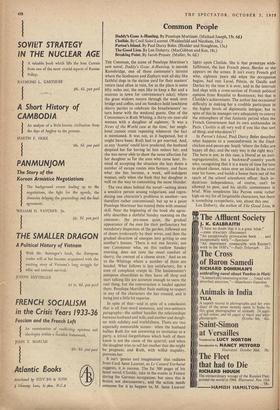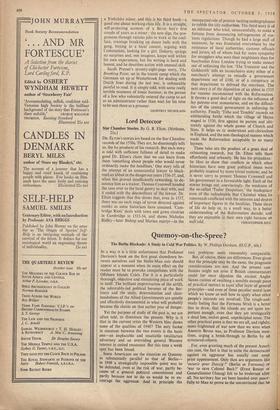Common People
Daddy's Gone A-Hunting. By Penelope Mortimer. (Michael Joseph, 13s. 6d.) Clotilde. By Cecil Saint Laurent. (Weidenfeld and Nicolson, 18s.) Parton's Island. By Paul Darcy Boles. (Hodder and Stoughton, 15s.) The Good Lion. By Len Doherty. (MacGibbon and Kee, 18s.)
Breaking Point. By Jacob Presser. (Muller, 9s. 6d.)
THE Common, the scene of Penelope Mortimer's new novel, Daddy's Gone A-Hunting, is outside Ramsbridge, one of those commuter's termini where the Sunbeams and Zephyrs wait all day like faithful dogs in the station yard for their masters' return (and often in vain, for as the place is some fifty miles out, the men like to keep a flat and a mistress in town for convenience's sake); where the grass widows mourn through the week over bridge and coffee, and on Sundays hold lunchtime sherry parties to celebrate the breadwinners' re- turn home with the weekend guests. One of the Commoners is. Ruth Whiting, a thirty-six-year-old woman with a daughter of eighteen; 'It was a News of the World case at the time,' her neigh- bour cannot resist repeating whenever the fact is mentioned. It was not, as it happened, but it might have been; Ruth had to get married. And, as any 'Auntie' could have predicted, the husband despised her for having let him seduce her, and she was never able to show the same nffection for her daughter as for the sons who came later. In- stead of accepting the situation she lays down a number of escape routes into fantasy, and faces what she has become, a weak, self-indulgent woman, only when she finds that her daughter is well on the way to committing the same blunder.
The two ideas behind the novel—setting down a sensitive person among vulgarians, and repro- ducing one character's problems in another—are therefore rather conventional; but up to a point Penelope Mortimer has treateci them with unusual skill. Near the beginning of the book she agree- ably describes a slothful Sunday morning on the common : the pre-noon quiet, the gradual appearance of the men for their perfunctory but mandatory inspection of the garden, followed out of doors irrelevantly by their wives, and then the gradual direction of energies into getting to one another's houses. 'There is not one heretic; not one Commoner who, on this mellow Sunday morning, does not taste the sweet comfort of sherry, the content of a cheese straw.' And so on to the Whitings where a number of them are headed. What follows is less satisfactory, for a note of complaint creeps in. The businessmen's pompous absurdities as they leave off shop and start talking life are accurate enough to seem the real thing, but the conversation is loaded against them. Penelope Mortifner finds nothing to respect in any of the characters she has created, and is being just a little bit superior.
In spite of that—and in spite of a conclusion that is all four-word sentences, and two-sentence paragraphs—the author handles the relationships between husband and wife, and mother and daugh- ter with subtlety and truthfulness. There are two especially memorable scenes : when the husband bullies Ruth for not answering an invitation to a party, a trivial forgetfulness which both of them know is not the cause of the quarrel; and when the daughter tries to tell her mother that she might be pregnant, and Ruth, with wilful stupidity, prevents her.
It isn't 'genius and imagination' that radiates from Cecil Saint Laurent, as Le Canard Enchaine suggests, it is success. The fat 500 pages of his latest novel,-Clotilde, take in the events in France during the German occupation; but since this is fiction not documentary, and the action needs someone for it to, happen to, M. Saint Laurent lights upon Clotilde. She is that prototype wish- fulfilment, the fast French piece, Bardot as she appears on the screen. It isn't every French girl who, eighteen years old when the occupation begins, had met Laval, Pdtain, de Gaulle and Darlan by the time it is over, and in the intervals had slept with a cross-section of French political opinion from Royalist to Resistance; but that is Clotilde's achievement. The author has occasional difficulty in making her a credible participant in the higher levels of diplomatic intrigue; but in spite of this he manages very adequately to convey the atmosphere of that fantastic period when the French Government had its own ambassador in Paris. Collide is all very well if you like that sort of thing; and who doesn't?
In Parton's Island, Paul Darcy Boles describes what happens to a nonconformist in the fried- chicken-and-pecan-pie Sonth 'where the folks are happy all day, and the easy way is the right way.' The hero is not, in this case, a liberal or an anti- segregationalist, but a backward' country youth who, recognising that it is a waste of time for him to attend classes, takes over an island in the river near his home, and builds a house there out of the reach of the school attendance officer. Such in- dustrious independence, of course, can't be allowed to pass, and his idyllic contentment is brief. Wise simpletons like Parton come rather high on my list of forgettable characters, but there is something sympathetic, too, about this one.
Len Doherty, the author of The Good Lion. is a Yorkshire miner, and this is his third book—a good one about working-class life. It is a straight, self-projecting account of a Bevin boy's first couple of years as a miner : the new digs, the pro- gression through various jobs to work at the coal- face, evenings breaking up dance halls with the gang, boxing in a local contest, arguing with Communists, looking for a girl. Doherty springs no surprises and, one imagines, keeps well within his own experiences, but his writing is hard and honest, and he describes action with unusual skill.
Jacob Presser's seventy-eight-page story, The Breaking Point, set in the transit camp which the Germans set up at Westerbrook for dealing with Dutch Jews during the last war, is unbearably painful to read. It is simply told, with some really terrible moments of ironic humour, in the person of a Jew who voluntarily entered the camp to act as an administrator rather than wait for his time to be sent there as a prisoner.
GEOFFREY NICHOLSON



















































 Previous page
Previous page